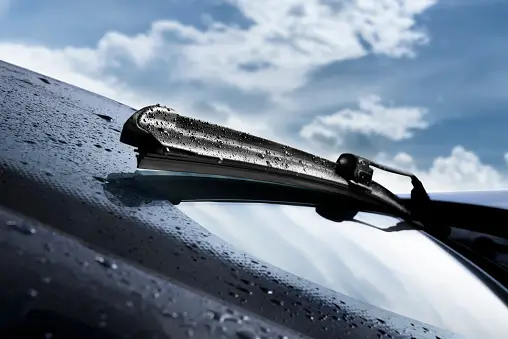September 7, 2023
Do windshield wipers get dirty?
Yes, windshield wipers can get dirty over time. When driving, your windshield wipers come into contact with various elements, such as rain, snow, dirt, dust, and debris. As they sweep across your windshield to clear away moisture and debris, some of these contaminants can accumulate on the wiper blades themselves. Over time, this buildup can cause your wiper blades to become less effective at clearing your windshield, which can result in streaks, smears, or reduced visibility.
To maintain good visibility while driving, it’s important to regularly clean your windshield wipers. You can do this by wiping the wiper blades with a clean cloth or paper towel soaked in windshield washer fluid or a mild detergent solution. This will help remove dirt, grime, and any residue that may have accumulated on the blades. Additionally, replacing worn-out wiper blades when they no longer effectively clear your windshield is important for safe driving in various weather conditions.

What happens if I run out of wiper fluid?
Running out of windshield wiper fluid can have several consequences, and it’s generally not advisable to drive without it, especially in inclement weather. Here are some potential issues you might face:
- Reduced Visibility: Windshield wiper fluid is essential for effectively cleaning your windshield. Without it, you may have difficulty removing dirt, grime, bugs, bird droppings, and other debris that can accumulate on your windshield. This can significantly reduce your visibility, especially in rainy or snowy conditions.
- Smearing and Streaking: If you attempt to use your windshield wipers without fluid, the wiper blades can drag dirt and debris across the glass, causing streaks and smears. This can impair your ability to see the road clearly and make driving hazardous.
- Potential for Damage: Running your wipers without fluid can lead to increased friction between the blades and the windshield. This can result in premature wear and tear on your wiper blades and potentially damage the windshield itself.
- Safety Concerns: Reduced visibility due to a lack of windshield wiper fluid can pose safety risks for you and other drivers on the road. It’s important to have a clear and unobstructed view of the road to drive safely.
To avoid these issues, it’s a good practice to regularly check and refill your windshield wiper fluid reservoir. Windshield washer fluid is relatively inexpensive and readily available at most automotive supply stores, gas stations, and convenience stores. Keep your reservoir topped up to ensure you can maintain clear visibility while driving, especially in adverse weather conditions.
Can we use shampoo for windshield wipers?
While it is technically possible to use shampoo as a substitute for windshield washer fluid in an emergency situation, it’s not recommended for several reasons:
- Effectiveness: Shampoo is not specifically formulated for cleaning automotive glass. Windshield washer fluid is designed to effectively remove road grime, bugs, and other debris without leaving streaks. Shampoo may not work as effectively and can leave residues on your windshield.
- Freezing Temperatures: Most windshield washer fluids are designed to withstand freezing temperatures. If you use shampoo in cold weather, it may freeze and damage your washer fluid system.
- Residue: Shampoo may leave a soapy residue on your windshield, which can cause glare when driving in bright sunlight. This residue can also attract dirt and dust, leading to reduced visibility.
- Potential Damage: The chemicals in shampoo may not be compatible with your vehicle’s washer fluid system and wiper blades. Prolonged use of shampoo could potentially cause damage to these components.
In a pinch, you can use plain water to temporarily clear your windshield, but it’s best to use actual windshield washer fluid for optimal cleaning and safety. If you run out of washer fluid, it’s a good idea to refill the reservoir with the appropriate fluid as soon as possible. Windshield washer fluid is designed to meet the specific needs of your vehicle’s washer system and ensure safe and effective cleaning of your windshield.
How often do you need wiper fluid?
The frequency with which you need to refill your windshield wiper fluid reservoir can vary depending on your driving habits and the weather conditions in your area. There is no fixed schedule for refilling wiper fluid, but here are some factors to consider:
- Driving Conditions: If you frequently drive in areas with a lot of dust, dirt, or bugs, you may need to refill your wiper fluid more often. These conditions can lead to a quicker depletion of your washer fluid.
- Weather: During rainy or snowy seasons, you may use your wiper fluid more frequently to maintain clear visibility. Additionally, some washer fluids have formulas designed for winter use, which can help prevent freezing in cold weather.
- Long Road Trips: If you’re planning a long road trip, it’s a good idea to check and top up your wiper fluid before you leave. Long hours on the road may require more frequent use of the windshield wipers and washer fluid.
- Personal Preference: Some drivers prefer to keep their wiper fluid reservoir consistently topped up to ensure they always have clear visibility. Others may refill it only when it’s nearly empty. The frequency can vary depending on your personal habits and preferences.
To ensure you have an adequate supply of wiper fluid when you need it, it’s a good practice to periodically check the fluid level in the reservoir and top it up as necessary. Many modern vehicles have a low-fluid indicator on the dashboard that will alert you when it’s time to refill. However, it’s still a good idea to check visually from time to time, especially before long trips or during seasons with challenging driving conditions.
